Clifford Garstang's Blog, page 144
November 1, 2010
The New Yorker: "Blue Roses" by Frances Hwang
I wanted to like this story. It's about Chinese immigrants (who watch Korean soap operas?). It's not about marital infidelity or cancer or child abuse--all pluses for me.. The narrator, Lin Fanghui, reminds me very much of Olive Kitteridge, the eponymous protagonist of Elizabeth Strout's Pulitzer Prize-winning novel-in-stories. (In the first story of that book, one doesn't care for Olive either.) Here, Lin has a falling out with her daughter because the daughter won't invite Lin's friend, Wang Peisan, for Christmas dinner. Wang is recently widowed and, although she doesn't really like Wang any more than anyone else does, Lin thinks it's proper to reach out to the woman.Wang deteriorates, Lin begins to feel that she's moving in the same direction, and she reconciles with her daughter. Not really much of a story, in the end.
What's likeable, though, is all of Lin's nuttiness along the way—how she interacts with her husband, her other children, Wang—and in the end this portrait of Lin is charming, in the same way that the portrait one eventually gets of Olive Kitteridge is charming. The character of Wang is also charming. Wang appreciates what Lin does for her. At one point Lin brings her a nice cake, but a month later Wang is still eating although it has "turned a mushroom shade and looked slick and congealed."
The conclusion, though, is a bit sentimental. I had hoped for more. (By the way, I was relieved when in the story a nod is made to Tennessee Williams and the source of the title.)
November 1, 2010: "Blue Roses" by Francis Hwang
What's likeable, though, is all of Lin's nuttiness along the way—how she interacts with her husband, her other children, Wang—and in the end this portrait of Lin is charming, in the same way that the portrait one eventually gets of Olive Kitteridge is charming. The character of Wang is also charming. Wang appreciates what Lin does for her. At one point Lin brings her a nice cake, but a month later Wang is still eating although it has "turned a mushroom shade and looked slick and congealed."
The conclusion, though, is a bit sentimental. I had hoped for more. (By the way, I was relieved when in the story a nod is made to Tennessee Williams and the source of the title.)
November 1, 2010: "Blue Roses" by Francis Hwang
Published on November 01, 2010 16:38
October 31, 2010
The Other Life by Ellen Meister
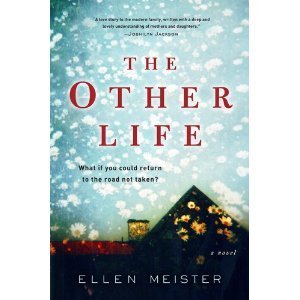 I'm hearing very good things about The Other Life by Ellen Meister, due out in January. It's available for pre-order now at Amazon, Barnes & Noble, etc.
I'm hearing very good things about The Other Life by Ellen Meister, due out in January. It's available for pre-order now at Amazon, Barnes & Noble, etc.Keep an eye out for this one, or order it now!
Published on October 31, 2010 04:36
October 29, 2010
I Love Bookstores
 I love bookstores, don't you? I also love books, and, even though I'm sorely tempted to buy a Kindle or Nook and will probably succumb eventually, I'll always buy new (and new-to-me) books. I went to a book discussion last night (the Reading Liberally book club discussed Paul Krugman's The Conscience of a Liberal
I love bookstores, don't you? I also love books, and, even though I'm sorely tempted to buy a Kindle or Nook and will probably succumb eventually, I'll always buy new (and new-to-me) books. I went to a book discussion last night (the Reading Liberally book club discussed Paul Krugman's The Conscience of a Liberal , which I highly recommend) and a couple of us had our copies of the paperback but two members had eBook versions. Maggie has an iPad and Fred has a Kindle. They're very different devices, but both remarkable. I don't think I want an iPad, but a Kindle or Nook would be great. (My book, In an Uncharted Country, will soon be released in a Kindle edition . . . )
, which I highly recommend) and a couple of us had our copies of the paperback but two members had eBook versions. Maggie has an iPad and Fred has a Kindle. They're very different devices, but both remarkable. I don't think I want an iPad, but a Kindle or Nook would be great. (My book, In an Uncharted Country, will soon be released in a Kindle edition . . . )But back to the subject of bookstores . . .
Nearly 5 years ago I wrote a post on this blog about local bookstores: Bookstores in the Valley. It was about the one used bookstore and one new bookstore in our town, and other local book-buying options. Things have changed a lot. In that post I wrote about the Bookstack and Final Draft, two stores on Beverley St. in Staunton, both of which have since closed. I wasn't happy about those losses, but somehow the bookstore scene isn't completely dead around here--probably because the nearest Barnes & Noble is 40 miles away, in Harrisonburg (the one in Charlottesville is about the same distance, but the mountain you have to cross to get there makes it seem farther).
I spend most of my book-browsing time in The Sacred Circle on E. Beverley. It's a little store that also has a large selection of fair-trade gift items in addition to its spirituality-focused inventory of books. There are current events and literature selections, too, but the books on religion and consciousness are what make the store special.
But I also spend time in the BookWorks on W. Beverley, a shop that concentrates just on books and magazines, and has a somewhat wider selection of fiction (although a lot of that is genre fiction that doesn't appeal to me).
And then there is Barrister Books, tucked away behind the courthouse on Lawyer's Row. This is a beautiful used bookstore that I visit frequently. Unlike the chaotic used bookstores (like Final Draft was), Barrister Books is quieter, well organized, and carries only better books -- don't go looking for trashy paperback novels.
But that's not all. We've also seen other bookstores pop up: Stone Soup Books opened in Waynesboro a couple of years ago. It's claim to fame is a cafe, a cozy atmosphere, and the fact that used and new books stand together on the same shelves. And just today I learned that another bookstore, John's Book Nook, opened earlier this year in Waynesboro. It is apparently a used bookstore. I haven't been there but I plan to visit soon.
And there's also Over the Moon Bookstore & Artisan Gallery which opened a few months ago in Crozet, just over the mountain from Waynesboro. It's a beautiful little bookstore (they're hosting me for a reading in two weeks) with a great selection.
In that post five years ago, I also mentioned the bookstores in Lexington-- Books & Co. (nice inventory of new books) and The Bookery (fun and chaotic, new and used), both of which are still alive and, as far as I can tell, doing well.
I suppose I should mention the other options, as well: Books-a-Million, which relocated from The Mall to the Target shopping center outside of Waynesboro. It's awful, although they do have a good selection of magazines. That's the only reason to go there. And the Barnes & Noble in Harrisonburg and Charlottesville are just like B&Ns everywhere. Okay. Not great. We also have the Green Valley Bookfair, which is unique. I confess that I shop there, but I feel guilty about it.
Considering that bricks & mortar bookstores are supposed to be dead, that is an incredible selection of bookstores. Suddenly I feel like buying a book. As if I needed any more . . .
Published on October 29, 2010 05:44
October 26, 2010
The New Yorker: "The Tree Line, Kansas, 1934" by David Means
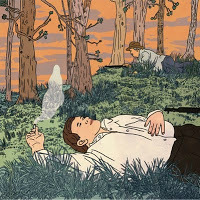
There's a lot about this story that I like. There's very little action here until the end—mostly we get interior monologue from one of the characters. I like the repetition of "Five days . . ." I like the thoughtfulness of the character Lee, the older of two FBI agents on a stakeout in search of Carson, a notorious robber. During the stakeout, the younger agent, Barnes, displays his youthful inexperience: he thinks they're wasting their time. But his logic becomes more and more convoluted: "This guy knows we're looking for patterns, and he's even considered, I'd venture to say, the idea that we'd expect him not to come back here, and in expecting him to expect us to expect him not to come back, he'd expect that we'd take that expectation into consideration . . ." He ties himself up in knots.
There's more repetition, too (giving additional weight to Barnes's talk about patterns): the two men take turns crawling off into the woods to smoke; Lee presents analytical lists, befitting his character; Lee's narrative alternates between the present action of the stakeout story and sections that begin with "Years later . . .", the author's signal that Lee has shifted into retrospection.
It is also the signal for what's coming in the story, and that is the story's biggest failing for me. It's predictable. Please, I said to the pages as I kept reading, don't let that be what happens. Much too easy. Please let the author work harder to surprise us! But, no. No surprises. It's a shame.
October 25, 2010: "The Tree Line, Kansas, 1934" by David Means
Published on October 26, 2010 16:22
FRiGG | Fall 2010 | Last Lilacs | Clifford Garstang
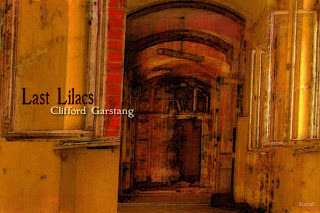 My story "Last Lilacs" is up in the Fall 2010 issue of the beautiful FRiGG magazine. Please have a look:
My story "Last Lilacs" is up in the Fall 2010 issue of the beautiful FRiGG magazine. Please have a look:FRiGG | Fall 2010 | Last Lilacs | Clifford Garstang
And then read the rest of the issue (FRiGG Fall 2010) which has wonderful work by Kathy Fish, Joseph Young, and others. FRiGG has long been one of my favorite online magazines and I am delighted to finally have my work appear there.
Published on October 26, 2010 11:38
And the Nominees are . . .
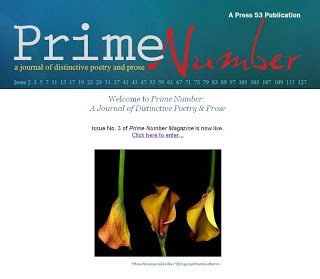 One of the fun things about being an editor of a magazine is the opportunity to select pieces from the magazine to be nominated for annual prize anthologies. Having been nominated for a few anthologies myself, I know what an honor it is to writers, so it's something I take very seriously as an editor.
One of the fun things about being an editor of a magazine is the opportunity to select pieces from the magazine to be nominated for annual prize anthologies. Having been nominated for a few anthologies myself, I know what an honor it is to writers, so it's something I take very seriously as an editor. There are lots of these annual anthologies: Pushcart, O. Henry, BASS. And, because it is very rare for online publications to be included in these anthologies (although we do plan to nominate for the Pushcart), we're very glad—as a brand new publication—to be able to nominate for anthologies that focus on the web. Specifically, Dzanc's Best of the Web 2011, which is taking nominations now until the end of the month.
For BotW2011, we could nominate three pieces in any combination of fiction, poetry, and nonfiction. I asked each of the editors of Prime Number Magazine to select from among our pieces in their genre, and then the three of us decided which of those selected would get the nominations. It wasn't easy! But we did it, and I sent the nominations in last night.
Very happy about that!
Published on October 26, 2010 05:15
October 24, 2010
Locals in Litmags
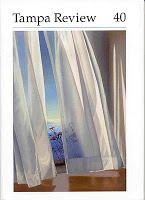 WriterHouse and The Bridge Progressive Arts Initiative are co-sponsoring a unique event in which I'm honored to participate: Locals in Litmags. Six local writers will be reading from work that has appeared within the past year in literary magazines. At this point I'm not sure who else is reading, but I'll be reading from "Artoyen's Razor," a story that just came out in The Tampa Review.
WriterHouse and The Bridge Progressive Arts Initiative are co-sponsoring a unique event in which I'm honored to participate: Locals in Litmags. Six local writers will be reading from work that has appeared within the past year in literary magazines. At this point I'm not sure who else is reading, but I'll be reading from "Artoyen's Razor," a story that just came out in The Tampa Review.The reading will be November 3 at 7:00 pm at The Bridge, 209 Monticello Rd., Charlottesville. Please come if you are in the area!
Published on October 24, 2010 19:20
October 22, 2010
Interview with Christine Schutt
One of the things I've enjoyed about being Editor of Prime Number Magazine is conducting interviews with writers. Only two so far, of course, but they were both fun, for different reasons. For the first issue I interviewed Josh Weil, author of The New Valley . I've known Josh for a couple of years and we've even done a reading together, plus I've heard him talk about his book. So I had a sense of what he would say and what questions could lead to some answers that would be interesting to readers.
. I've known Josh for a couple of years and we've even done a reading together, plus I've heard him talk about his book. So I had a sense of what he would say and what questions could lead to some answers that would be interesting to readers.
 For Issue 3 of Prime Number I interviewed Christine Schutt, author of Florida
For Issue 3 of Prime Number I interviewed Christine Schutt, author of Florida  and All Souls
and All Souls , among other books. And that was fun because even though I've known Christine for as long as I've known Josh, I had much less of an idea of what to expect from the interview. Since I generally conduct the "interview" by email, I sent my questions off (after reading the two novels and one of her story collections) and waited for the reply. What I got back was simply stunning, as I think you'll agree. Although it is largely responsive to my questions, it turns out be a beautiful essay on writing.
, among other books. And that was fun because even though I've known Christine for as long as I've known Josh, I had much less of an idea of what to expect from the interview. Since I generally conduct the "interview" by email, I sent my questions off (after reading the two novels and one of her story collections) and waited for the reply. What I got back was simply stunning, as I think you'll agree. Although it is largely responsive to my questions, it turns out be a beautiful essay on writing.
 . I've known Josh for a couple of years and we've even done a reading together, plus I've heard him talk about his book. So I had a sense of what he would say and what questions could lead to some answers that would be interesting to readers.
. I've known Josh for a couple of years and we've even done a reading together, plus I've heard him talk about his book. So I had a sense of what he would say and what questions could lead to some answers that would be interesting to readers. For Issue 3 of Prime Number I interviewed Christine Schutt, author of Florida
For Issue 3 of Prime Number I interviewed Christine Schutt, author of Florida  and All Souls
and All Souls , among other books. And that was fun because even though I've known Christine for as long as I've known Josh, I had much less of an idea of what to expect from the interview. Since I generally conduct the "interview" by email, I sent my questions off (after reading the two novels and one of her story collections) and waited for the reply. What I got back was simply stunning, as I think you'll agree. Although it is largely responsive to my questions, it turns out be a beautiful essay on writing.
, among other books. And that was fun because even though I've known Christine for as long as I've known Josh, I had much less of an idea of what to expect from the interview. Since I generally conduct the "interview" by email, I sent my questions off (after reading the two novels and one of her story collections) and waited for the reply. What I got back was simply stunning, as I think you'll agree. Although it is largely responsive to my questions, it turns out be a beautiful essay on writing.
Published on October 22, 2010 11:42
October 19, 2010
Issue 3 of Prime Number is LIVE!
 Issue No. 3 of Prime Number Magazine is now LIVE!
Issue No. 3 of Prime Number Magazine is now LIVE!I'm really pleased with the issue. We've got new stories by novelists Richard Wiley and John Givens, plus work by Anne Leigh Parrish, Jon Trobaugh, and Meagan Ciesla. In poetry we have selections by Susan Meyers, Mark Smith-Soto, Lola Haskins, and Nick Ripatrazone. And there are four very fine essays--by Randall Horton, Elizabeth Bernays, Nina Feng, and Joe Mills. On top of all that we've got a review of Lori Ostlund's story collection, The Bigness of the World
 , and interviews with novelists Emma Rathbone and Christine Schutt.
, and interviews with novelists Emma Rathbone and Christine Schutt.And check out that beautiful "cover" photo--"Three Hanging Calla Lilies" by Katinka Matson.
And don't forget that we're open for submissions for Issue No. 5 (scheduled for mid January, so get your work in soon).
Published on October 19, 2010 05:40



